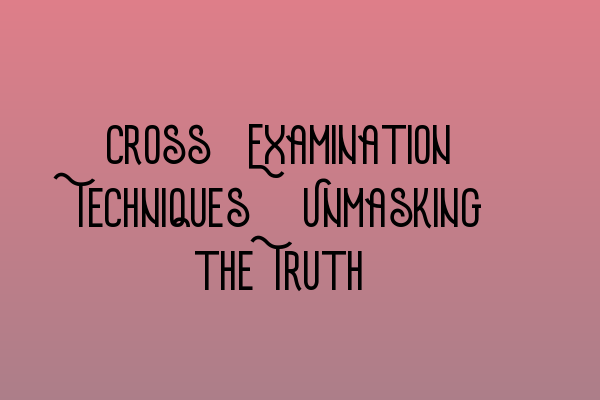Cross-Examination Techniques: Unmasking the Truth
Welcome to SQE Criminal Law & Practice Law UK! As a solicitor, it is vital to possess the skills necessary to effectively cross-examine witnesses in court. A well-executed cross-examination can reveal inconsistencies, uncover the truth, and ultimately contribute to a successful case outcome.
At SQE Criminal Law & Practice Law UK, we are committed to providing you with valuable insights and strategies to enhance your cross-examination techniques. In this article, we will explore proven methods to unmask the truth through skillful questioning and evidence analysis.
Preparing for Cross-Examination
Preparation is key to a successful cross-examination. Before stepping into the courtroom, ensure that you have a thorough understanding of the case, including the facts, evidence, and legal issues at hand. Familiarize yourself with the witness statements, expert reports, and any other relevant documents.
Furthermore, consider attending workshops and seminars on criminal practice to expand your expertise. These events offer opportunities to learn from experienced practitioners, gain insights into recent developments in criminal law, and sharpen your cross-examination skills. Click here to learn more about workshops and seminars on criminal practice.
The Power of Effective Questioning
During cross-examination, it is crucial to ask precise and thought-provoking questions that lead to the revelation of the truth. Avoid broad and open-ended questions that give witnesses the opportunity to avoid answering directly. Instead, focus on using leading questions that guide witnesses to provide the desired responses.
Remember to actively listen to the answers and be prepared to adapt your questioning approach accordingly. Look for inconsistencies in the witness’s statements and use them to challenge their credibility. By carefully analyzing the evidence and utilizing effective questioning techniques, you can effectively unmask the truth.
Staying Informed and Prepared
As criminal laws evolve, it is essential to stay informed and prepared. Regularly update your knowledge on changes in UK criminal laws and precedents through reliable sources. To help you in this endeavor, we offer comprehensive updates on UK criminal laws on our website. Click here to explore updates in UK criminal laws.
Additionally, make use of mock tests for SQE Criminal Practice to simulate exam scenarios and evaluate your progress. These tests ensure that you are equipped with the necessary skills and knowledge to excel in your examinations. Click here to learn more about mock tests for SQE Criminal Practice.
Collaboration and Group Study
Enhancing your SQE Criminal Law study group experience can provide valuable insights and perspectives. Engaging in discussions and collaborative study sessions can help you deepen your understanding of the subject matter and gain different perspectives on cross-examination techniques. Click here to discover ways to enhance your SQE Criminal Law study group experience.
Analyzing Criminal Evidence Rules
Criminal evidence rules play a crucial role in cross-examination. Understanding these rules in detail allows you to effectively challenge and evaluate evidence presented by witnesses. To decode criminal evidence rules and learn advanced techniques for evidence analysis, we offer a detailed analysis on our website. Click here to access the detailed analysis on criminal evidence rules.
In conclusion, mastering cross-examination techniques is essential for every solicitor practicing criminal law. Through careful preparation, effective questioning, staying informed, collaborating with peers, and understanding criminal evidence rules, you can unmask the truth and present a compelling case in court. Remember to continuously enhance your skills and knowledge to achieve success in your criminal practice career.
